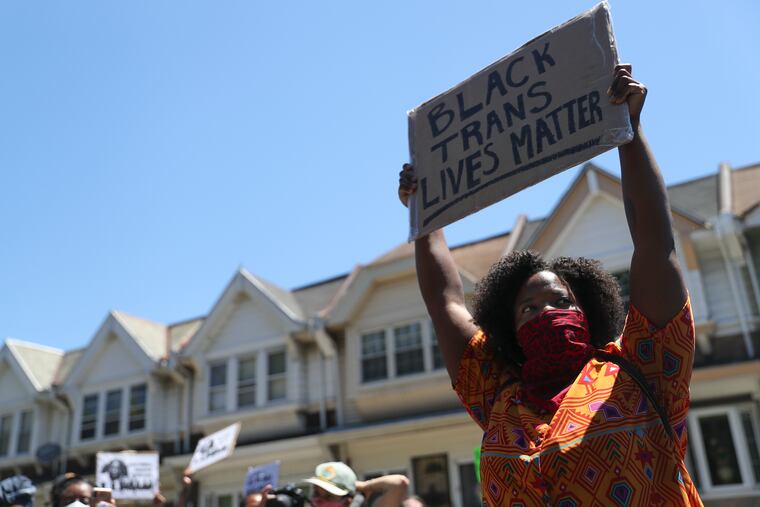Philly Pride is normally marked by a parade. This year, the queer community will march for Black Lives.
In the wake of the killing of a black transgender woman, LGBTQ leaders are planning a march to “recommit to Pride.”

Andrea Lamour-Harrington was working in HIV prevention months ago at Morris Home, a nonprofit that supports Philadelphia’s transgender community, when she met Dominique “Rem’mie” Fells. “She was one of us,” Lamour-Harrington recalled.
Fells’ name is now known nationwide. The Philadelphia 27-year-old was one of three black transgender people killed since George Floyd’s death at the hands of a Minneapolis police officer in May began a national reckoning over violence against black Americans.
Now, Lamour-Harrington is fighting for women like Fells and herself — black trans women, who are disproportionately targets of violence — by speaking Sunday at an LGBTQ Pride month event that’s not a parade or a party, but a protest.
“If we’re not in a place to help, if we’re not in a place where we feel like it’s time to stand up, and we just let things happen,” she said, “more of the damage and carnage to our community is going to keep happening.”
Lamour-Harrington is one of dozens of people organizing the Philly Queer March for Black Lives, a protest planned for Sunday that leaders expect to attract hundreds of LGBTQ Philadelphians and allies. The march is one of a handful of LGBTQ-centric protests in a Pride month that’s been dramatically altered by the COVID-19 pandemic, which has forced most events like parades and celebrations to go virtual.
Leaders in Philadelphia’s queer community said Fells’ slaying further solidified the necessity of what they’d been working on: a Pride month event organized by a dozen different LGBTQ groups and led by black activists within those organizations.
“We have a community that is hurting and a community that doesn’t feel seen,” said Tariem Burroughs, an organizer with Philadelphia Family Pride and the Liberty City LGBT Democratic Club. “And so organizations are really lining up to have these conversations to figure out how we as a community can really work together to be seen and be heard.”
» READ MORE: Advocates, friends urge action after transgender woman killed in Philadelphia
Liberty City leadership said they knew weeks ago it wouldn’t be as simple as throwing a Pride parade and saying it’s aligned with Black Lives Matter. They learned from organizers in Los Angeles, who scuttled plans for a march after taking heat for failing to reach out to black leaders and planning the event in conjunction with law enforcement
On Sunday, thousands in L.A. instead attended an “All Black Lives Matter” march, which called for LGBTQ rights and racial justice and was organized entirely by black LGBTQ people.
In Philly, leaders said they’re not coordinating with law enforcement and haven’t announced where the march will go, other than saying it will begin at John F. Kennedy Plaza at 1:30 p.m. Sunday. There won’t be glitter, it won’t be a party atmosphere, and dozens of organizers are on board, from groups including Philadelphia Black Pride, William Way LGBT Community Center, the Mazzoni Center, the Philadelphia Dyke March, the Attic Youth Center, and more.
“We are coming together because queer and trans folks have been left out of the conversation,” said Tiffany Thompson, an organizer with the Philadelphia Dyke March, “and we’re going to continue to say it loud so that people know that black queer and trans lives are also part of the movement.”
The Philadelphia LGBTQ community and the Gayborhood have for the last several years grappled with a long history of racism, as have queer communities across the country. New outcry came in 2016 after video emerged of a Gayborhood bar owner saying the N-word, which set off a cascade of events forcing the community to reckon with how to tackle racism.
Thompson said she and other black queer folks in Philly still often feel racism permeates the community, but they keep organizing “because we care about the importance of black lives and black queer lives and black trans lives.”
Gregory Yorgey-Girdy is a black organizer with Liberty City and Philadelphia Family Pride, two groups he said have historically been led by white activists. This weekend’s march, he said, is as much about protesting as it is about education, and forcing those uncomfortable talking about racism to begin a process of introspection.
“One of the things about a cut is, you have to expose it in order to heal it,” he said. “It is here, and it’s not going to go away. So once we admit it and try to do something about it, we can begin to heal.”